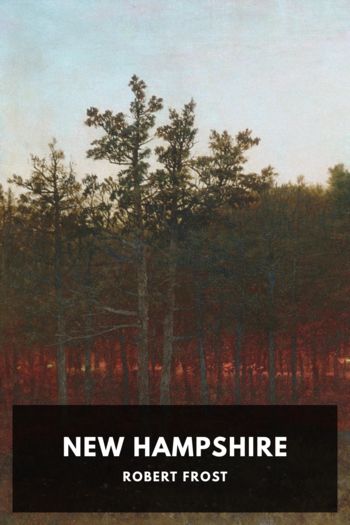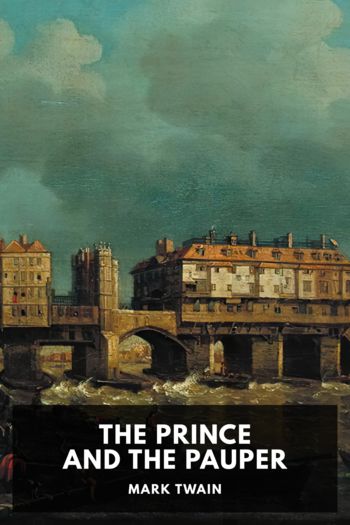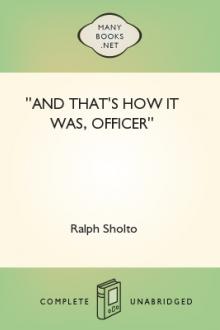New Hampshire by Robert Frost (i love reading .TXT) 📕

- Author: Robert Frost
Book online «New Hampshire by Robert Frost (i love reading .TXT) 📕». Author Robert Frost
Before, that is, they are themselves accepted,
And boys the minute they get out of college.
I can’t help thinking those are tests to go by.
And she has one I don’t know what to call him,
Who comes from Philadelphia every year
With a great flock of chickens of rare breeds
He wants to give the educational
Advantages of growing almost wild
Under the watchful eye of hawk and eagle—
Dorkings because they’re spoken of by Chaucer,
Sussex because they’re spoken of by Herrick.
She has a touch of gold. New Hampshire gold—2
You may have heard of it. I had a farm
Offered me not long since up Berlin way
With a mine on it that was worked for gold;
But not gold in commercial quantities.
Just enough gold to make the engagement rings
And marriage rings of those who owned the farm.
What gold more innocent could one have asked for?
One of my children ranging after rocks
Lately brought home from Andover or Canaan
A specimen of beryl with a trace
Of radium. I know with radium
The trace would have to be the merest trace
To be below the threshold of commercial,
But trust New Hampshire not to have enough
Of radium or anything to sell.
A specimen of everything, I said.
She has one witch—old style.3 She lives in Colebrook.
(The only other witch I ever met
Was lately at a cut-glass dinner in Boston.
There were four candles and four people present.
The witch was young, and beautiful (new style),
And open-minded. She was free to question
Her gift for reading letters locked in boxes.
Why was it so much greater when the boxes
Were metal than it was when they were wooden?
It made the world seem so mysterious.
The S’ciety for Psychical Research
Was cognizant. Her husband was worth millions.
I think he owned some shares in Harvard College.)
New Hampshire used to have at Salem
A company we called the White Corpuscles,
Whose duty was at any hour of night
To rush in sheets and fool’s caps where they smelled
A thing the least bit doubtfully perscented
And give someone the Skipper Ireson’s Ride.
One each of everything as in a show-case.
More than enough land for a specimen
You’ll say she has, but there there enters in
Something else to protect her from herself.
There quality4 makes up for quantity.
Not even New Hampshire farms are much for sale.
The farm I made my home on in the mountains
I had to take by force rather than buy.
I caught the owner outdoors by himself
Raking up after winter, and I said,
“I’m going to put you off this farm: I want it.”
“Where are you going to put me? In the road?”
“I’m going to put you on the farm next to it.”
“Why won’t the farm next to it do for you?”
“I like this better.” It was really better.
Apples? New Hampshire has them, but unsprayed,
With no suspicion in stem-end or blossom-end
Of vitriol or arsenate of lead,
And so not good for anything but cider.
Her unpruned grapes are flung like lariats
Far up the birches out of reach of man.5
A state producing precious metals, stones,
And—writing; none of these except perhaps
The precious literature in quantity
Or quality to worry the producer
About disposing of it. Do you know,
Considering the market, there are more
Poems produced than any other thing?6
No wonder poets sometimes have to seem
So much more business-like than business men.
Their wares are so much harder to get rid of.
She’s one of the two best states in the Union.
Vermont’s the other. And the two have been
Yoke-fellows in the sap-yoke from of old
In many Marches.7 And they lie like wedges,
Thick end to thin end and thin end to thick end,
And are a figure of the way the strong
Of mind and strong of arm should fit together,
One thick where one is thin and vice versa.
New Hampshire raises the Connecticut
In a trout hatchery near Canada,
But soon divides the river with Vermont.
Both are delightful states for their absurdly
Small towns—Lost Nation, Bungey, Muddy Boo,
Poplin, Still Corners (so called not because
The place is silent all day long, nor yet
Because it boasts a whisky still—because
It set out once to be a city and still
Is only corners, cross-roads in a wood).
And I remember one whose name appeared
Between the pictures on a movie screen
Election8 night once in Franconia,
When everything had gone Republican
And Democrats were sore in need of comfort:
Easton goes Democratic, Wilson 4
Hughes 2. And everybody to the saddest
Laughed the loud laugh, the big laugh at the little.
New York (five million) laughs at Manchester,
Manchester (sixty or seventy thousand) laughs
At Littleton (four thousand), Littleton
Laughs at Franconia (seven hundred), and
Franconia laughs, I fear—did laugh that night—
At Easton. What has Easton left to laugh at,
And like the actress exclaim, “Oh my God” at?
There’s Bungey; and for Bungey there are towns,
Whole townships named but without population.9
Anything I can say about New Hampshire
Will serve almost as well about Vermont,
Excepting that they differ in their mountains.
The Vermont mountains stretch extended straight;
New Hampshire mountains curl up in a coil.
I had been coming to New Hampshire mountains.
And here I am and what am I to say?
Here first my theme becomes embarrassing.
Emerson said, “The God who made New Hampshire
Taunted the lofty land with little men.”
Another Massachusetts poet said,
“I go no more to summer in New Hampshire.
I’ve given up my summer place in Dublin.”
But when I asked to know what ailed New Hampshire,
She said she couldn’t stand the people in it,
The little men (it’s Massachusetts speaking).
And when I asked to know what ailed the people,
She said, “Go read your own books and find out.”
I may as well confess myself the author
Of several books against the world in general.
To take them as against a special state
Or even nation’s to restrict my meaning.
I’m what is called a sensibilitist,
Or otherwise an environmentalist.
I refuse to adapt myself a mite
To any change from hot to cold, from wet
To dry, from poor to rich, or back again.
I make a virtue of my suffering
From nearly everything that goes on round me.10
In other words, I know wherever I am,
Being the creature of literature I am,
I shall not lack for pain to keep me awake.
Kit Marlowe taught me how to say my





Comments (0)